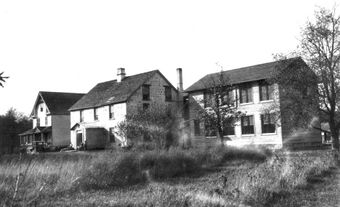This article was originally published in Maclean’s magazine on April 3, 2000. Partner content is not updated.
Sitting in his wood-panelled office at the Alberta legislature, Ralph Klein contemplates the political fire storm raging outside his door.Klein's Controversial Health-Care Reform
Sitting in his wood-panelled office at the Alberta legislature, Ralph Klein contemplates the political fire storm raging outside his door. Succinctly, the Alberta premier sums up the negative public perception of his controversial health-care legislation that, if passed, would expand the private sector's role in providing surgery. "The great debate," Klein tells Maclean's during a wide-ranging interview last week, "is whether this is the beginning of the so-called slippery slope down the road to two-tiered medicine." The allegation, he adds, is that his Conservative government is out to create "this awful American-style for-profit type of health care."
Leave it to Klein, a former television reporter, to provide a pithy snapshot of the political crimes of which he stands accused. But just as swiftly, the premier proclaims his innocence - citing his own famous instinct for political survival as evidence. Why, Klein asks, would he set out to dismantle Canada's cherished medicare system? "I wouldn't do anything to purposefully and intentionally get myself unelected," he says. "I don't want to get fired."
On that score, at least, Klein's critics and supporters agree: the premier is a consummate politician, one who rarely allows himself to get far out of step with the electorate. As Calgary's hugely popular mayor from 1980 to 1989, and especially as premier for the past seven years, Klein has often courted controversy - but never public censure. For many political observers, that makes his crusade on behalf of Bill 11 - officially known as the Health Care Protection Act - all the more puzzling. Just when Alberta is in the enviable position of pouring surplus dollars into an ailing public health-care system, Klein is pushing for a greater role for private-sector medicine - and contending with the unease and fear such a move inevitably engenders. University of Calgary political scientist David Taras is among those scratching their heads. "Normally," says Taras, "Klein has an incredibly astute sense of where the public is at on a given issue. But on this one, he seems to be offside."
An Angus Reid Group survey on political trends reinforced that view last week. A poll of 800 Albertans conducted during the last week of February pegged the government's approval rating at 66 per cent, a seven-point drop since October, and its lowest level in two years. Klein's personal approval rating also dropped, to 65 per cent from 71. While even those reduced numbers would be the envy of many a political leader in Canada, a more ominous finding for Klein emerged from the survey undertaken as his privatization proposals dominated public discussion. The number of Albertans citing health care as their most important concern ballooned to 72 per cent from 47 per cent in October.
Already, though, there are clear signals of the lengths Klein is willing to go to stem the groundswell against Bill 11. The most contentious aspects of the legislation are provisions that, for the first time, would allow some private clinics in Alberta to perform surgical procedures requiring overnight stays. The types of operations performed in what the government dubs "approved surgical facilities" would be determined by the provincial college of physicians and surgeons. Possible procedures would include hernia, knee, gall bladder, and ear, nose and throat surgery. All operations would be fully covered by the provincial health-care plan.
Klein has touted the plan as a sincere effort to reduce surgical waiting lists - often stretching upwards of 12 months - and relieve pressure on the public system so that it can deal more effectively with major cases such as heart attacks and serious trauma. He has spoken of the letters he receives from ordinary Albertans relating the pain of loved ones awaiting basic surgeries. Klein also brings personal experience to the table: he watched last year as his father, Phil, a former professional wrestler, waited in agony for a hip replacement.
For months, Klein maintained that a prime reason for Bill 11 was to reduce the waiting lists for hip-replacement operations. But the day after the bill was tabled on March 2, that argument lost credence when the registrar for the Alberta College of Physicians and Surgeons said most hip replacements were likely too complex to be done in private clinics. At the same time, prominent physicians and medical associations have stated that the real key to reducing waiting lists is hiring more doctors and nurses and making the best possible use of existing public facilities.
Last week, Klein spoke in detail for the first time about specific measures he is contemplating to appease critics who abhor the notion of for-profit health care. Asked by Maclean's if he would consider amending Bill 11 to confine surgeries requiring overnight stays to nonprofit clinics only, he replied: "Am I going to say yes to that right now? No, I can't say yes to that." Then he continued: "I can say that would be a reasonable amendment to put on the table - and to debate the pros and cons." He also addressed fears that Bill 11 would throw the doors open to American service providers. At the very least, he said, he is giving serious thought to amending the bill, when it comes up for formal debate on April 4, to have it state a clear "preference" for contracting out surgeries to Canadian not-for-profit clinics.
It remained unclear, however, whether such measures would quell the howls of protest from organizations lined up against the legislation, including the Canadian and Alberta medical associations, the Canadian and Alberta associations of registered nurses, and the Alberta chapter of the Consumers' Association of Canada. Then there is the Friends of Medicare, a loose coalition of union activists, clergy and seniors, which, together with the Alberta Liberal party, has staged rancorous town-hall meetings on Bill 11 across the province.
That campaign is being financed primarily by the Canadian Union of Public Employees, which represents 150,000 health-care workers across the country. In addition to a series of television ads claiming that Klein is putting medicare at peril, CUPE commissioned legal opinions that argue that, because of the North American Free Trade Agreement, Bill 11 could lead to a flood of U.S. corporations providing Canadians with health-care services.
Bill 11 is the hot political issue in Alberta. It has consumed the daily question period during the legislature's spring session, which began on Feb. 17. Klein's chief inquisitor is opposition leader Nancy MacBeth, a former Conservative health minister and Klein leadership rival before she was elected Liberal leader in 1998. There is no love lost between the two, as evidenced during one recent exchange, when Klein responded to a MacBeth query by calling the Liberal leader "all yap, yap, yap - a lot of mouth and no substance."
But perhaps the premier's most formidable foe is federal Health Minister Allan Rock. In a March 10 speech at the University of Calgary, Rock argued that Bill 11 would do none of the things its proponents claim - including shortening waiting lists, cutting costs and improving the quality of patient care. But Rock pointedly declined to answer the most crucial question: did Bill 11 violate the Canada Health Act, the 1984 federal legislation that sets out the guiding principles for medicare? Klein angrily dismissed Rock's whirlwind visit to Alberta as a "drive-by smear" and shot off a one-sentence letter to Prime Minister Jean Chrétien in which he described Rock's conduct as "a disgrace to you and your government."
Ottawa is still not committing itself on whether Bill 11 directly contravenes the federal health legislation. Before addressing a Liberal fund-raising dinner in Calgary last week, Chrétien met privately with Klein. Chrétien took a conciliatory tone, saying he will wait until Bill 11 is put into practice to see if it leads to any violations of the Canada Health Act. But if it does, he added, Ottawa will not hesitate to punish the province by withholding federal transfer payments. Asked if Klein should withdraw the bill now, Chrétien replied: "That is his job, not mine - I have enough to do in the House of Commons." Earlier in the week, Rock had told the Commons he thought the bill should be withdrawn. Commented Klein after meeting Chrétien: "I like the Prime Minister's attitude much more than I like Mr. Rock's."
In his interview with Maclean's, Klein was more blunt, saying he found it "bizarre" that a federal minister should urge a province to kill a bill even before it was passed. "We've been asking him all along to tell us if the bill violates the Canada Health Act and, if so, how can we fix it? But he won't do that. He just says he doesn't like it, scrap it." In a conversation with Maclean's after the Klein-Chrétien meeting, Rock did not repeat his advice to withdraw the bill, instead backing the Prime Minister's stance that Ottawa would pass judgment only after any amendments were in place. Ottawa, he added, has a duty to monitor health-care developments in the provinces. "Canadians look to the government of Canada as the guardian of the Canada Health Act," said Rock, who meets with his provincial counterparts this week. "We don't have 10 provincial health-care systems - we have one national system.
Klein, however, accuses the federal Liberals of harbouring "an anti-Alberta agenda." The premier saw signs of bias in last week's revelation that, for the past two years, a private surgery clinic in Montreal has rented operating rooms to surgeons from the area's public hospitals who, in turn, charged their patients a "facility fee" of about $400 per hour. Asked Klein: "Why wouldn't Mr. Rock focus on something like that, which is a flagrant violation of the Canada Health Act, rather than his obsession with the legislation here in Alberta?"
In some respects, Bill 11 does seem an unlikely rallying point for such a high-profile war of words between Ottawa and Edmonton. On one level, the bill represents an attempt to set out rules and conditions for the 53 for-profit, private clinics already offering Albertans day surgeries - for cataracts, cosmetic work, hernias and minor orthopedic procedures, among others.
As these clinics mushroomed in recent years, critics raised concerns about the possibility of some patients being able to pay to jump ahead of others in line for surgery, or of physicians pressuring patients to buy services beyond those that the provincial health-care plan covers. Bill 11 forbids the practice of queue-jumping and sets forth conditions for how, and when, patients may be sold non-insured goods and services. Violators face fines of $10,000 for a first offence and $20,000 for each subsequent one.
The legislation's provision to allow private facilities to perform surgeries requiring overnight stays flows, in large part, from the efforts of one such clinic, Calgary's Health Resources Group. On three separate occasions since 1996, the HRG has applied, unsuccessfully, to the Alberta College of Physicians and Surgeons for the right to do such procedures. The college, in turn, asked the provincial government for political direction. Bill 11 is the response.
To its supporters, Bill 11 represents modest reforms that would give health officials greater flexibility in their war on surgical waiting lists. Jim Dinning, who served for five years as Klein's provincial treasurer, is now chairman of the Calgary Regional Health Authority. Dinning predicts that, if the bill passes, Calgary will roughly double the annual number of surgical procedures currently contracted to the private sector (8,000, compared with 85,000 done in the hospitals), thereby relieving some of the pressure on public facilities. "The premier isn't talking about turning the system upside down," says Dinning. "All he's saying is health authorities need this one tool in addition to all the other things they are doing."
But to critics like MacBeth, Bill 11 is "Trojan horse" legislation that "throws wide open the potential to privatize virtually any part of the health-care system." MacBeth adds that "this whole notion of physician-as-entrepreneur is very foreign to Canada and could very much affect the relationship between doctors and their patients."
MacBeth's argument has clearly struck a nerve. Many Albertans, like other Canadians, hold deep-seated reservations about anything with even the appearance of American-style for-profit medicine. The Alberta Tories knew this when they drafted Bill 11, which is why the first clause in the legislation states: "No person shall operate a private hospital in Alberta." But that tactic also proved troublesome: critics, including Alberta Medical Association president David Bond, accuse the government of hiding behind semantics. They say they see little distinction between a private hospital and the proposed "surgical facilities" with overnight stays.
Klein's government entered the debate over Bill 11 carrying other baggage. Severe budget cuts imposed by the Tories in the mid-1990s in a successful bid to eliminate a $4-billion provincial deficit resulted in layoffs, bed closures and the outright elimination of some hospitals. The government has started to pump money back into the health-care system - committing an extra $1.1 billion over three years. But opponents say Bill 11 is the wrong way to fix a problem largely created by the same government draining hospitals of resources.
As the debate rages, one element is surprisingly absent: Klein's legendary populist touch has rarely been on display in recent weeks. The premier often appears defensive, even petulant. He rejected a challenge from MacBeth to publicly debate Bill 11 outside the legislature by claiming that "every left-wing nut in the country" would be attracted to such a forum - an assertion undercut by the fact that among the bill's critics are many longtime Tory and Reform party supporters.
All the same, those who have watched Klein over the years doubt he will be content to play defence for very long. The premier's apparent willingness to consider significant amendments to Bill 11 - and potentially defuse a national debate he sparked in the first place - suggests his political antennae are back in operation. "Never underestimate Ralph Klein's ability to get back onside with the public," advises the University of Calgary's Taras. "Experience shows their forgiveness is almost endless."
Maclean's April 3, 2000

 Share on Facebook
Share on Facebook Share on X
Share on X Share by Email
Share by Email Share on Google Classroom
Share on Google Classroom


